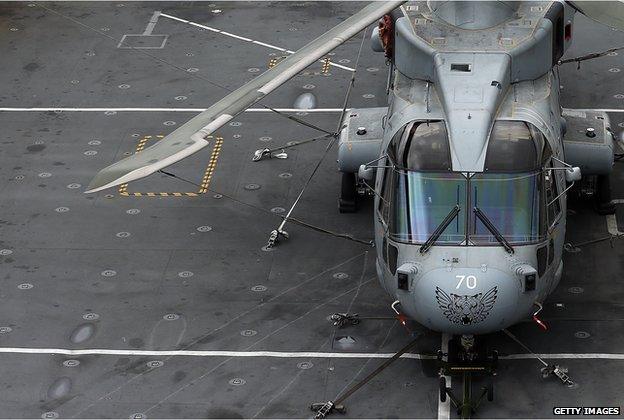Budget 2015: Defence breathes a sigh of relief
- Published
- comments

With hindsight you might say there were hints from Michael Fallon, the Defence Secretary, and briefings from those around George Osborne that defence would escape the worst effects of what was widely expected to be an austerity budget.
But even so, today's announcement - that the forces' budget would meet the 2% of GDP Nato target until 2020 - caught many Whitehall insiders by surprise.
During the election campaign it was calculated that this would add £6bn a year to military spending by 2020, but with new economic growth projections that figure could be even higher.
One person who can say, "I told you so," is former Nato Secretary General Anders Fogh Rasmussen. Back in spring, weeks before the election, he told me - as we finished an interview for Radio 4 - that he was confident the UK would meet the 2% target, that he had received assurances to that effect from No 10, and that this would only be announced after the country had gone to the polls. As the Nato chief during September 2014's Wales Summit, when that spending target had been set, he had a very particular interest in this.
Try as I could, I couldn't find a second source for what Mr Rasmussen had told me, and we had finished recording when he said it, so the story went no further. As the election campaign continued, both the Conservatives and Labour refused to commit to the 2% target and many, including senior officers in the forces, concluded heavy cuts were on the cards.
Not only did the Conservatives allow themselves to be painted as a party about to take an axe to cherished regiments or warships, but they remained true to the political logic of that position. So, for example, when Andrew Neil and I cross examined the party defence spokespeople late in April, for the Daily Politics Defence and Security Debate, Mr Fallon would not concede that threats to Britain's security had increased - despite events in Ukraine or the rise of the Islamic State group.
Now that he can count on a substantially bigger budget, he will presumably have to change this position, and argue that the UK is buying new maritime patrol aircraft or fighter planes because a worsening international security environment demands it. What a difference a (Budget) day makes.
So unexpected is this turn of events that many Whitehall-watchers have been looking for small print, a catch that might mean the government isn't being quite as generous as it suggests. Attention focused first on a new £1.5bn Security Fund for the intelligence and counter terrorist people, also announced today, but apparently, no, that's quite separate to the defence pledge. Then others asked whether some spending such as war pensions or peacekeeping operations, might get lumped into the MoD's budget, eating away at the increase.
While we cannot yet categorically rule out such budgetary sleight of hand, there can be no doubt that, particularly towards the end of the Parliament, there will still be substantially more cash going through Defence.
Many have been asking me today "why on earth didn't they say this before the election?" The explanation that they hadn't yet done the sums back in April doesn't hold water - assurances had been given to certain people like Mr Rasmussen. I understand similar signals had been given privately to the US.
So what do we conclude from all this? That in an election where the health service and benefits cuts were key battlegrounds, even a party that historically has prided itself as strong on defence feels unable to make the argument for spending more on it. As the top brass and contractors ease the champagne corks, celebrating their unexpected good fortune, that's worth remembering.
For more analysis on the 2015 Budget, see Newsnight Live